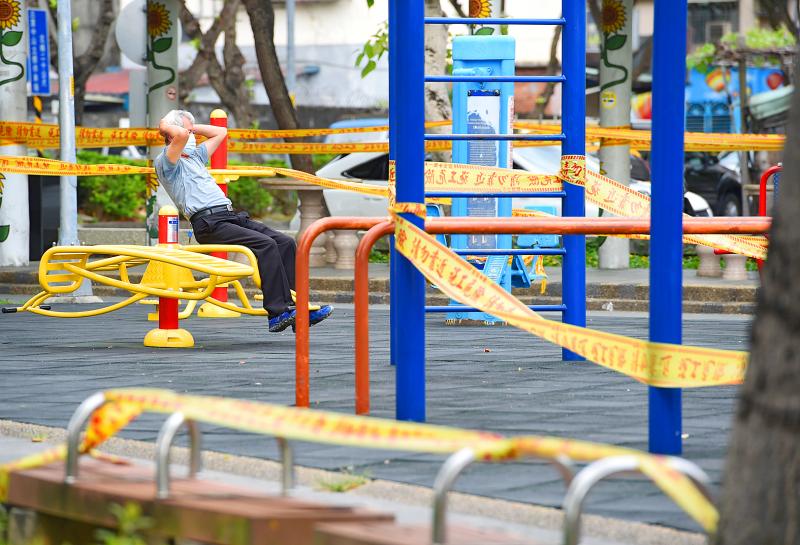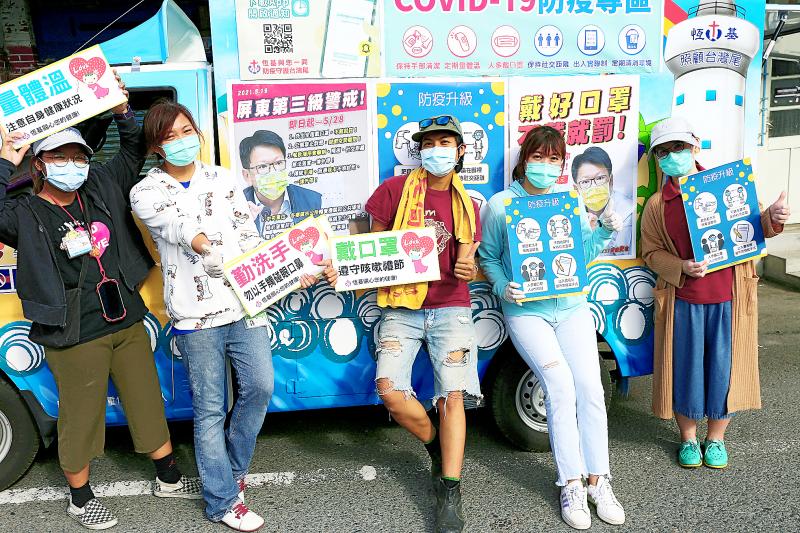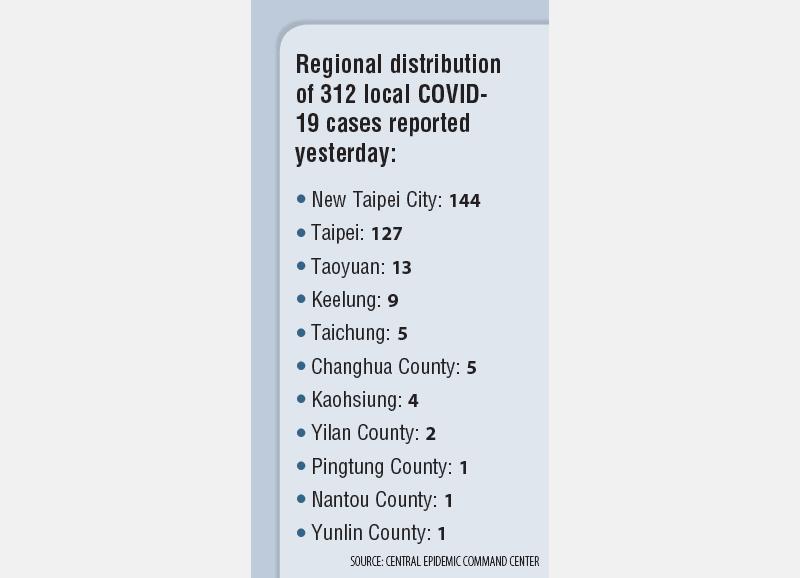The Central Epidemic Command Center (CECC) yesterday reported 312 new local COVID-19 cases and called on local governments to implement disease prevention measures consistent with pandemic alert level 3 guidelines.
“The outbreak is still at its peak,” Minister of Health and Welfare Chen Shih-chung (陳時中), who heads the center, told a news conference in Taipei, calling on the public to reduce nonessential travel over this weekend.
Next week is crucial to determine whether Taiwan’s measures to contain an accelerating outbreak of the virus centered in Taipei and New Taipei City have been successful, he said.

Photo: Liu Hsin-de, Taipei Times
Among the 312 new cases — 170 male and 142 female — the majority live in northern Taiwan: 144 in New Taipei City, 127 in Taipei and 13 in Taoyuan, Chen said.
He said that 107 of them had recently been to Taipei’s Wanhua District (萬華), adding that 73 had visited teahouses, six had links to a civic group, five had links to a fruit vendor and 24 had no traceable sources of infection.
The infection sources of 72 cases are unclear, and the source of 25 infections is under investigation, Chen said.

Photo: Tsai Tsung-hsien, Taipei Times
The center on Wednesday raised the nationwide pandemic alert to level 3, following level 3 alerts imposed in Taipei and New Taipei City on Saturday last week.
Asked whether the CECC might raise the alert to level 4, Chen reiterated his previous statement that the center has no such a plan.
CECC guidelines prescribe that the alert should be raised to level 4 if an average of 100 daily cases or more is reported for two straight weeks, with half of them having no identifiable source.

Under a level 4 alert, most business activities would be suspended, as well as classes at schools, and people would be required to stay at home if not for essential activities.
New Taipei City Mayor Hou You-yi (侯友宜) on Wednesday said that the city is adopting measures close to a level 4 alert, calling on residents to brace for tightened regulations.
Regarding whether to raise the alert level, the center also considers additional factors to assess the COVID-19 risk in Taiwan, Chen said yesterday, adding that only a quarter to one-third of the recently reported cases were not traceable.
Despite the center of the outbreak being in the north, the CECC aims to set consistent standards for the whole nation, as this would make disease prevention easier, he said.
Asked if the center would follow the Taipei and New Taipei City governments in implementing a ban on dining at food stalls in wet and night markets, as well as food courts at markets, Chen said that there is no need under level 3 alert guidelines.
Level 3 guidelines require eateries to record contact information of visitors, and if they are unable to do so, they can only serve take-out customers, Chen said.
The center yesterday also reported three new imported cases, arrivals from the US, the Philippines and Canada.

A Ministry of Foreign Affairs official yesterday said that a delegation that visited China for an APEC meeting did not receive any kind of treatment that downgraded Taiwan’s sovereignty. Department of International Organizations Director-General Jonathan Sun (孫儉元) said that he and a group of ministry officials visited Shenzhen, China, to attend the APEC Informal Senior Officials’ Meeting last month. The trip went “smoothly and safely” for all Taiwanese delegates, as the Chinese side arranged the trip in accordance with long-standing practices, Sun said at the ministry’s weekly briefing. The Taiwanese group did not encounter any political suppression, he said. Sun made the remarks when

The Taiwanese passport ranked 33rd in a global listing of passports by convenience this month, rising three places from last month’s ranking, but matching its position in January last year. The Henley Passport Index, an international ranking of passports by the number of designations its holder can travel to without a visa, showed that the Taiwan passport enables holders to travel to 139 countries and territories without a visa. Singapore’s passport was ranked the most powerful with visa-free access to 192 destinations out of 227, according to the index published on Tuesday by UK-based migration investment consultancy firm Henley and Partners. Japan’s and

BROAD AGREEMENT: The two are nearing a trade deal to reduce Taiwan’s tariff to 15% and a commitment for TSMC to build five more fabs, a ‘New York Times’ report said Taiwan and the US have reached a broad consensus on a trade deal, the Executive Yuan’s Office of Trade Negotiations said yesterday, after a report said that Washington is set to reduce Taiwan’s tariff rate to 15 percent. The New York Times on Monday reported that the two nations are nearing a trade deal to reduce Taiwan’s tariff rate to 15 percent and commit Taiwan Semiconductor Manufacturing Co (TSMC, 台積電) to building at least five more facilities in the US. “The agreement, which has been under negotiation for months, is being legally scrubbed and could be announced this month,” the paper said,

Japan and the Philippines yesterday signed a defense pact that would allow the tax-free provision of ammunition, fuel, food and other necessities when their forces stage joint training to boost deterrence against China’s growing aggression in the region and to bolster their preparation for natural disasters. Japan has faced increasing political, trade and security tensions with China, which was angered by Japanese Prime Minister Sanae Takaichi’s remark that a Chinese attack on Taiwan would be a survival-threatening situation for Japan, triggering a military response. Japan and the Philippines have also had separate territorial conflicts with Beijing in the East and South China